In Pictures: John Rutter In Conversation at St Luke’s – 21 June 2015
John Rutter, the world-famous composer and conductor, spent an hour in conversation with the St Luke’s Music Festival artistic director, John Cotterill, for the seventh event of the fortnight.
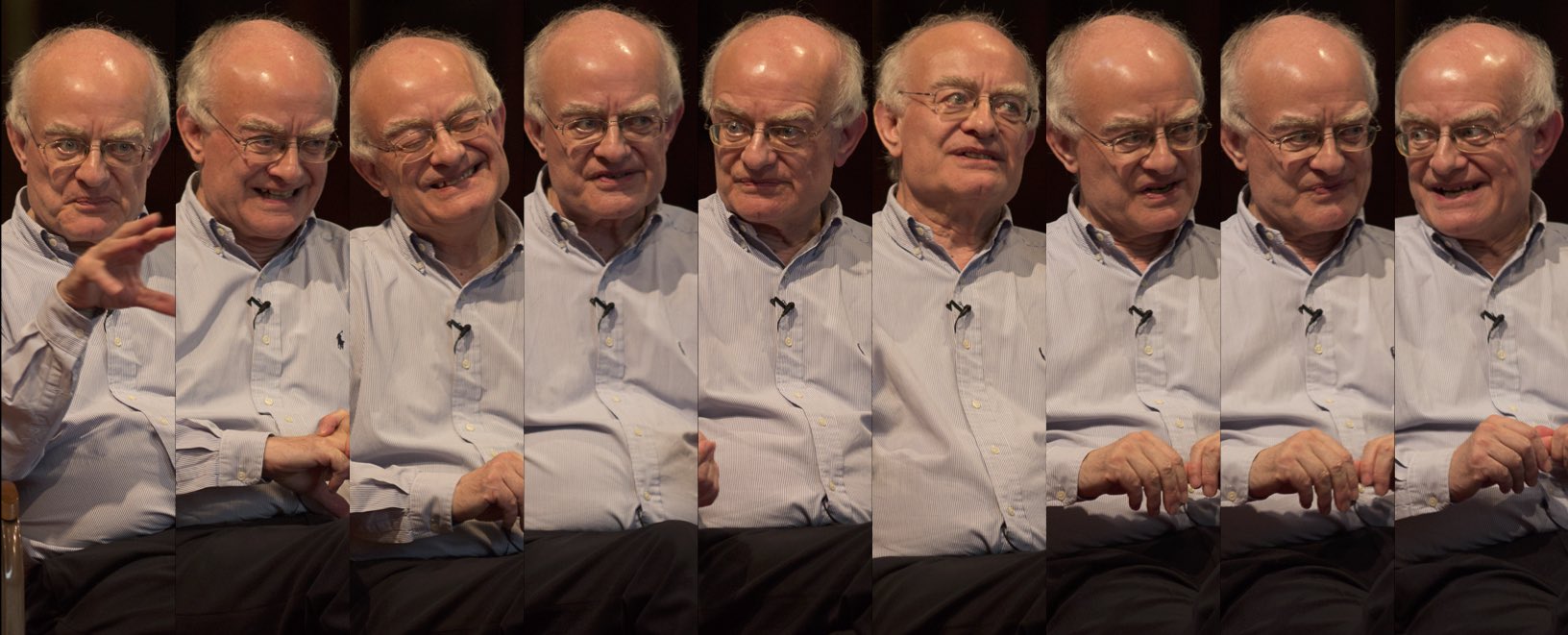
Snapshots of John Rutter’s animated talk at St Luke’s Church, Maidenhead, part of the church’s 2015 Music Festival.
[IMAGE: © Andrew Burdett 2015]
In the world of music, John Rutter’s name is synonymous with a particular brand of choral arrangement: saccharine melodies, mawkish lyrics, and a ‘cheesy key-change’ forty bars before the end. As a result, any similar music by other composers is derided with the old choristers’ joke: ‘I can’t believe it’s not Rutter’.
“People sometimes criticise my music for being too sunny,” he says, some way into the interview, “they say it’s too much ‘honey and flowers’. But that, probably, is what I do best. You’ve got to have hope; somehow to have a sense of a better future. I sometimes get fed up with the relentless darkness of the art world today.”
Indeed, on the surface, Rutter oozes with calm. At nearly 70, he maintains a calendar of engagements that would exhaust many — and yet, here he is, totally relaxed, answering questions about his life and work before a hundred-strong audience. Dressed in a casual Ralph Lauren striped Oxford shirt, dark navy suit trousers, and his trademark wireframe glasses (he was identified as being short-sighted at age eight), he’s an image of ataraxy. Perhaps this is down to his pre-existing relationship with his interviewer – he met John Cotterill many years ago through the Association of British Choral Directors, of which Rutter is a Vice-President – or simply because of the promise of a cream-tea.
“You seem such a calm gentle man”, says Cotterill, “is there not some hidden fury?”. “I’m calm,” comes the cautious reply, “providing things don’t go wrong. Composers try to make anger out of everything. I’m not like that. My wife tells me that I have unrealistic expectations, by trying to handle the stresses of, for example, an airport with a total calmness.”
But he does seem to do such a good job of it. Just last night he was in Bristol, conducting his major work Mass of the Children with 150 young voices, as well as the City of Bristol Choir and a professional symphony orchestra. “Conducting children is a bit like herding cats”, Rutter jokes, “although they were wonderfully good come the concert”.
The conducting takes around half of his professional time; the rest is filled with composing. When Cotterill asks which he prefers, Rutter says that they are both “different”. “With conducting, the hard part is there in the moment. Like being a pilot, it’s a highly stressful thing requiring 100 per cent concentration at the time, but when it’s done, it’s done, and you can relax and leave it.” Composing, on the other hand, “haunts you continually”. A very solitary exercise, one is left “starved of company”, and for that reason, Rutter explains, “I couldn’t do it all of the time”. Even when a piece is finished, “for ten minutes you’re pleased it’s done, but immediately you feel you need to be moving on to the next”.
Undeniably, this is a man whose life has been devoted to music — work that was recognised when he was awarded a CBE in the Queen’s New Year Honours List in 2007. He recalls the moment before he ticked the box marked ‘Yes’ to accept the honour. “I remembered the words of my old Latin teacher: ‘Dear boys, decline all orders, except for the Order of Merit, for that is the only one worth having’. So I remembered his words, hesitated, and then ticked the box anyway.” The award was for ‘services to music’, Cotterill clarifies. “Yes. I wouldn’t do anything else for the world”. Rutter is, of course, in the fortunate position of not needing to do anything else — for all the snobbish, snarling mutterings, he does receive plenty of praise. “When someone makes it clear that they enjoy what you do, that’s wonderful. All actors or musicians who say ‘I never read reviews’ are certainly telling a bit of a fib. Even those who seem to go far beyond what would normally be popular are partly beholden to reviews. I’m very lucky: I’ve certainly had my share of recognition.”
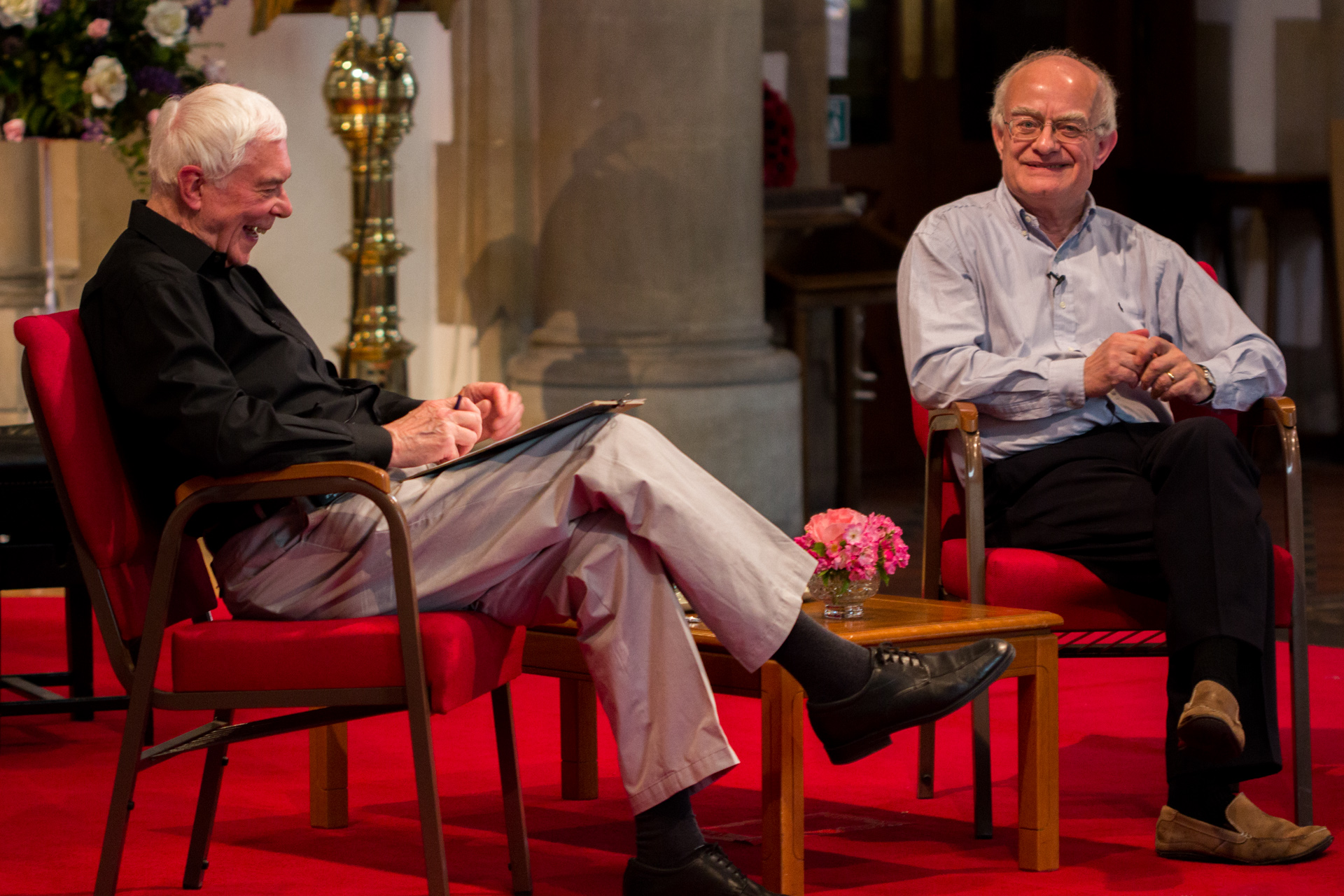
John Cotterill (left) with John Rutter (right), during an interview staged as part of the St Luke’s Music Festival 2015.
[PHOTO: © Andrew Burdett 2015]
The conversation moves on to how his 65-year-long love affair with music began. “My parents were not at all musical: my father [an industrial chemist] enjoyed it and appreciated it, but had no musical training. So I wasn’t pushed into it, by any means.” He begins to describe one of his earliest memories: “On the top floor of our house there was an old upright piano, left behind by the previous occupants, probably because it was too difficult to take with them when they moved out. It must have been winched in or something, as it certainly wouldn’t go back down the stairs. So when I was about three or four, while other lads were kicking footballs in the park, I climbed up and started picking out tunes with one finger, from Swan Lake and so on. That’s when my parents realised they had an oddity.”
“You don’t choose music as a way of life. Music chooses you.”
He went to Highgate School, which he credits with sparking what became his career: “For most musical people, you get your love from somewhere: if not from home, then from church or from school. It was from school in my case.”.
“At Highgate, I was encouraged to take – and then went on to be taught – A Level music by Edward Chapman, who had himself been taught by Charles Wood, [Charles Villiers] Stanford’s successor as Professor of Music at Cambridge. This meant I had the benefit of learning under someone who thought composition was normal. Lots of us became composers.” His classmates included Howard Shelley, Brian Chapple, and the late John Tavener, whom “of course”, he says, “we all miss”. “He was, I suppose, my best mate at school. It’s interesting that he and I both went on to write lots of sacred music over the years.”
There is clearly an affection for his Music teacher, probably as “it was Chapman who said ‘Why not go to Cambridge?'”.
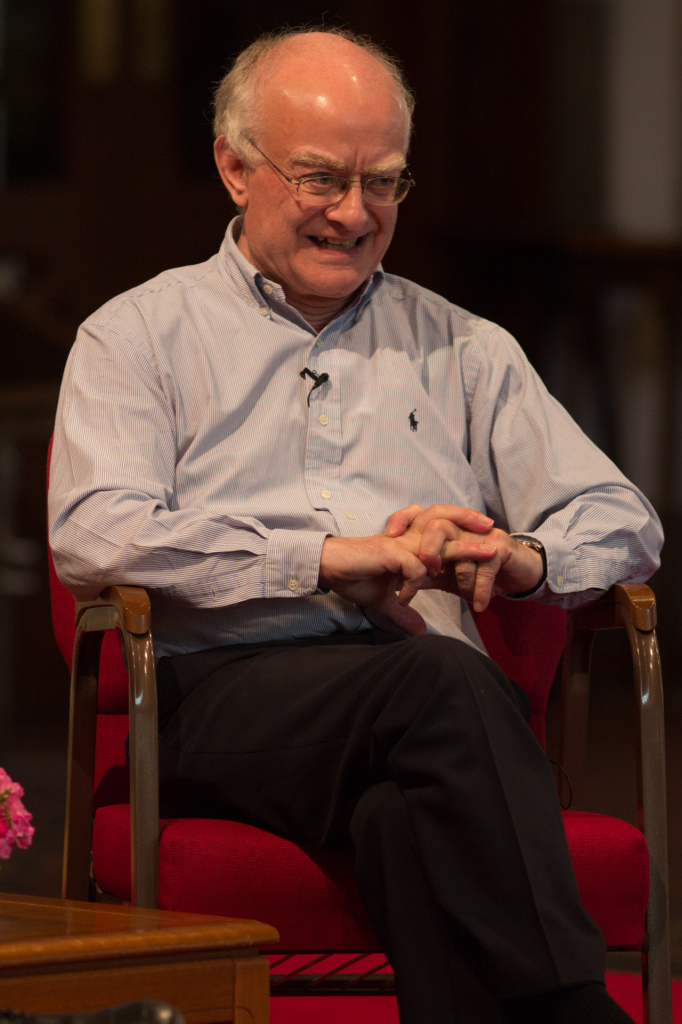
John Rutter recounted many anecdotes during the hour-long conversation.
[PHOTO: © Andrew Burdett 2015]
But not all of the staff were so encouraging. Beyond the easy smile, one senses a genuine bitterness when Rutter describes the school’s principal, Alfred John Farr Doulton. “The headmaster was a real bucket of cold water, convinced that I should not do Music. At the end of the annual reports given to each student, there was a space for the Head to write his own words, and there I read: ‘This boy has proven academic ability. Is he sure that music is a career for him? It is precarious…'”, at this point trailing off, laughing with the audience at the fact “I still remember his words today”. “He’s long dead, but I wish I could go back and see him and show him his old scrawl.”
Applying to Clare College, as the prestige of King’s seemed just too daunting, he arrived for his admissions interview for, as it was then set to be, Modern Languages. “Part way through the interview, I stopped and admitted: ‘I think I’m a musician’. The senior tutor took a long, heavy puff of his pipe — then, breathing out, sighed: ‘I think you ought to see Dr Temperley.’.” Rutter’s sense of humour shines through once again at this point, chuckling that it sounded as if he were being sent for psychiatric testing; some form of mental correction with the college doctor. In fact, no. After a short conversation and brief written assessment, Rutter was allowed to proceed as a Music undergraduate.
It’s clear he fell in love with Cambridge. “Is it the best place on Earth?”, asks Cotterill. Rutter’s response does not gush with the praise one might have expected of a man who’s spent the last 45 years around the banks of the Cam. He does, however, single out its choral groups: “It’s not that it’s the best place on Earth, but I don’t think there’s another city with so many fine choirs. I’d be lost without them. You can have a treat, any day of any week — just walk in off the street and listen to a choral evensong.”.
Cambridge undoubtedly shaped and defined the rest of Rutter’s life. A couple of years earlier, whilst in the Sixth Form, he had entered Shepherd’s Pipe Carol into a carol competition being judged by David Wilcocks, the renowned conductor, organist, and composer. Rutter was disappointed to hear nothing back; the competition won instead by someone else, with not even a commendation of note. Now at Cambridge, Rutter was learning under the self same legendary man. As choral director at neighbouring King’s, Wilcocks heard the piece performed at an Advent carol service which Rutter was conducting, and afterwards requested to see the manuscript. Almost immediately, he offered to have it published, and the pair went on to co-edit several volumes of the essential Carols for Choirs series, with Rutter still just a student. “David Wilcocks was definitely the more senior half of the partnership”, admits Rutter, but it’s clear that the two of them got along well. “When I asked about my piece, he told me: ‘Hmm, I think it must have improved since I first saw it’.”
Rutter would return to Clare College as its Director of Music from 1975 to 1979, “an exciting time, as the colleges were beginning to accept female voices into chapel choirs. It was a period of great change”. The role was restrictive, though, “as you had to be in Cambridge during term-time, meaning I was forced to decline opportunities to conduct abroad”. Furthermore, the pay was pitiful, with a stipend of just £350 a term “which was not much, even back then. The sense was that, with my published works, I could support myself anyway”. Before he left the post, the pay-packet was reluctantly increased — “but now in my mid-thirties I was at a crossroads”.
It was in America, during a choral workshop Rutter was running in California, that he met his wife JoAnne. “She looked at me, and looked at me again. Then she said: ‘You’re John Rutter? The John Rutter?! I thought you were at least 80! Or… dead.'” With a twinkle still there in his eye, he goes on: “I was able to tell her that I was indeed younger and in much better health than she had previously believed. So I took her to England, showed her Glyndebourne [the opera festival he still attends annually], softened her up in Venice, and then quickly got in the question: ‘Will you marry me?'”. The wedding took place at his alma mater, and the couple remain happily married today.
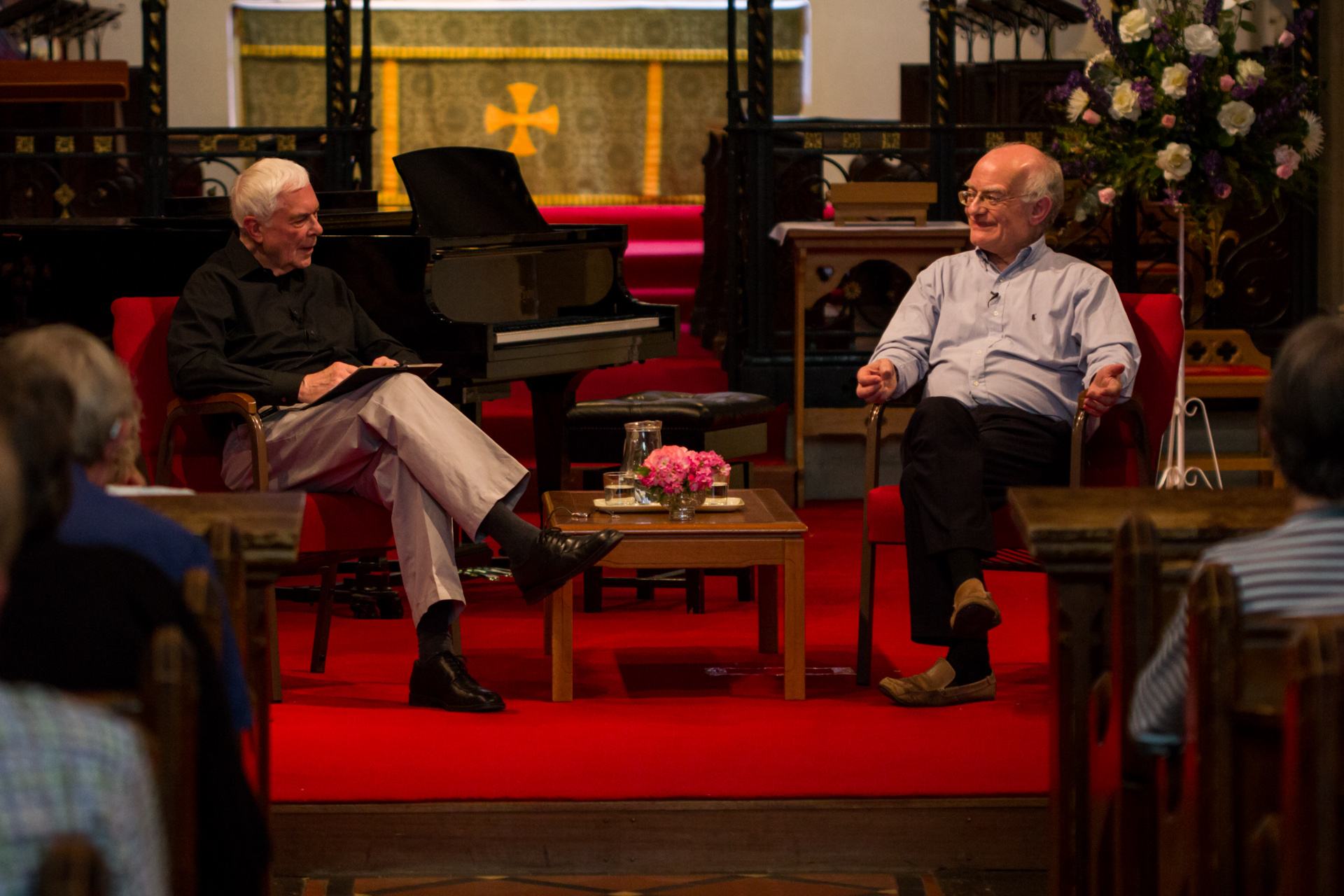
Cotterill and Rutter entertained the hundred-strong audience for just over an hour.
[PHOTO: © Andrew Burdett 2015]
His apparent grounding in Christianity’s traditions leads Cotterill to question Rutter’s faith. “I obviously grew up in the Church of England, sang in the school chapel choir, and mine was probably the last generation to regularly use the 1611 King James Bible and and 1662 Book of Common Prayer. That never leaves you. It’s a terrific foundation.”. But does he believe now? “Well, like many people in Britain, I’m not very good at signing on dotted lines. I stop short of weekly worship — and I see the good in many faiths. But I remain a huge friend, fellow traveller, and agnostic supporter of the Christian Church”. Asked about his own funeral, though, he accepts it is to religion he will turn once more: “When I keel over I want the full works: a graveyard burial to follow a church funeral, and the funeral has to have a choir… there’s a list of about 86 pieces I want sung.”.
The laughter this generates subsides as the discussion moves on to the poignant subject of child bereavement. “You, like me,” John Cotterill says tenderly, “lost your son. How did you deal with that grief?”. Rutter pauses for a moment before briefly describing the accident. In 2001, when he was just nineteen, his oldest son Christopher was killed by a car whilst crossing a road. “Life seems to stop”, says Rutter. “Nineteen years is not really enough. But I found solace in my belief that nobody’s life counts for nothing. We all make a difference, however short our time is. The dark loss of bereavement does turn to something good eventually.” (A Clare College musicians’ scholarship now exists to the memory of Christopher Rutter.)
“I don’t know if Christopher’s death changed my work patterns, but it did teach me that life is sacred and life is good. Don’t waste it.”
It is not unusual – far from it, in fact – for composers to base works around their own suffering and pain. Cotterill wonders if the accident inspired any of Rutter’s subsequent compositions. “I specifically haven’t composed anything ‘for Christopher’, but I realised, as I conducted the Mass of the Children last night, that his memory is written all over that work.” It is worth noting that the Mass was the first major work Rutter produced after his son’s death.
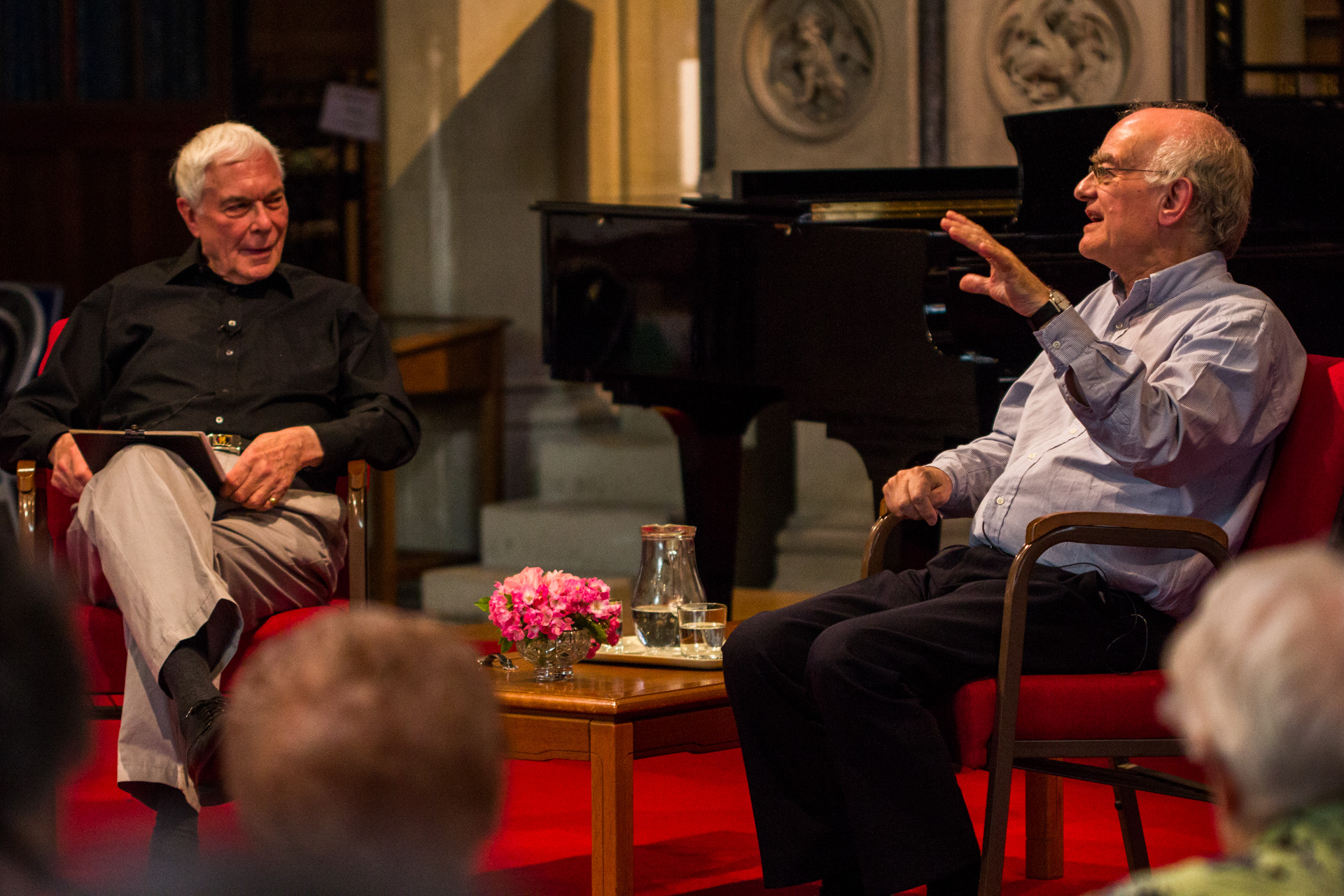
The exclusive, hour-long conversation was chaired by John Cotterill – an old friend of Rutter’s. The pair met at the Association of British Choral Directors.
[PHOTO: © Andrew Burdett 2015]
Cotterill seems particularly interested in the art of composing, and how such a master goes about the writing process. “I still use pencil and ink”, Rutter responds, “my first sketches are always still in pencil. In fact, I advise you, if you have any spare cash, invest in music manuscript. The young generations bypass it; instead they enter their compositions straight into the computer. But in a hundred years, nobody’s going to bid at Sotheby’s for a hard-drive, yet they’ll still be clamouring to own an original Beethoven composition. I throw mine away, and then JoAnne comes and fishes them out of the waste-paper basket, saying: ‘Wait a minute! You could sell that to an American university!'”.
“I can’t start without an idea of a text and where it is going to go. It inspires me when a melodic fragment goes round and round my head: the Shepherd’s Pipe Carol came about from that one phrase, “On the way to Beth-le-hem”, and then grew and grew. I don’t like writing my own text, but sometimes – especially with commissions – you have to. I once had David Dimbleby ring up wanting a piece for his patron charity, the Council for the Protection of Rural England, who were celebrating their 70th anniversary. You can scour the Bible as much as you like but you won’t find anything about ‘take your rubbish home with you’ or ‘separate your recycling’. So in that case I wrote something about beauty, and it became Look At The World.”
“I tend to write one big work every ten year or so.” The Gloria was published in the 1970s, the Requiem in the 80s. The Magnificat came out in 1990 and the Mass of the Children in 2003.
So that’s the composing. On the conducting side, he has his own choir, the Cambridge Singers, which was “effectively formed overnight”. The BBC were scheduled to record a programme with John Rutter conducting, and the producer had assumed the Clare College choir would be available to sing. As Rutter had recently left the directorial position at Clare, though, this was not the case. With the recording fast-approaching, he rang up a number of people he knew “and they all came together like that”. “It’s stayed fairly similar — I mean, the membership has obviously changed, but they’re all still young ex-Cambridge, ex-Oxford, ex-Music College students, happy to be involved”. “The wonderful thing with them is you can just hand the music out and they sing it perfectly. If you work with other choirs, you’ll know how privileged I am.”
Rutter also formed his own record label, Collegium Records, to release recordings of a sacred choral repertoire. This was in response to a gap in the market: most of the major labels were not interested in what was thought at the time to be a very niche, unprofitable, aspect of classical music. Happily for Rutter, this period coincided with the birth of the CD and the market proved hungry for high-quality choral singing.
Now, he gets by in the enviable position of being able to live off the royalties from his compositions and recordings, giving him the freedom to spend time doing what he loves best: conducting his choirs, composing in his cottage retreat, cooking “in a very amateur sort of way”, and enjoying riverside walks. “I read,” he says, “but I’m an ignoramus of the visual arts.”
The hour-long interview draws to a close, but there’s one final question on which he passes, cheekily posed by Revd Sally as she thanks Rutter for his time: “We currently have a vacancy for our Director of Music position. Would you possibly consider…”
No. The audience applaud a great raconteur, as the eagerly-anticipated St Luke’s cream-tea beckons.
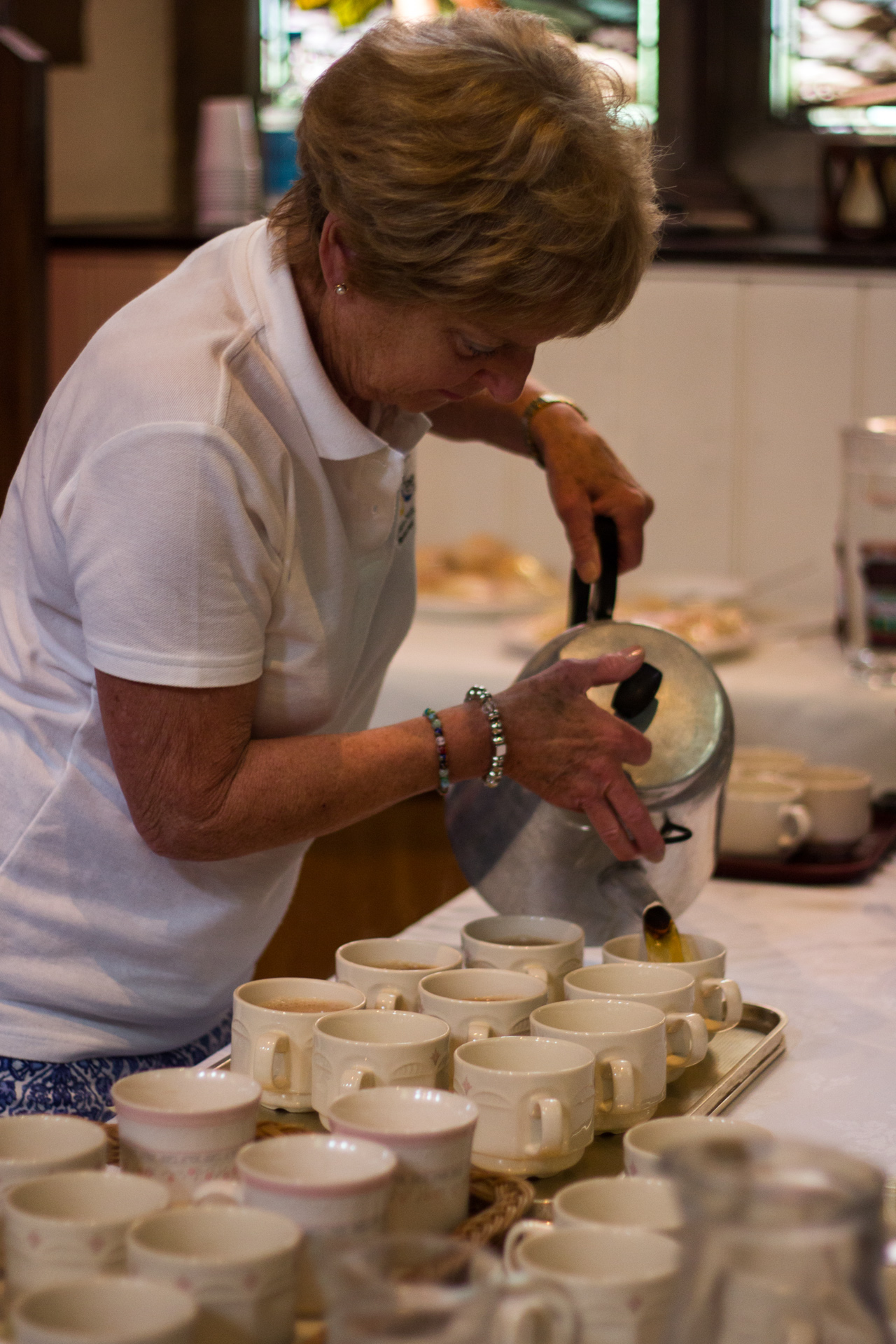
Doing a sterling job, Sally Somerville poured tea for audience-members to enjoy.
[PHOTO: © Andrew Burdett 2015]
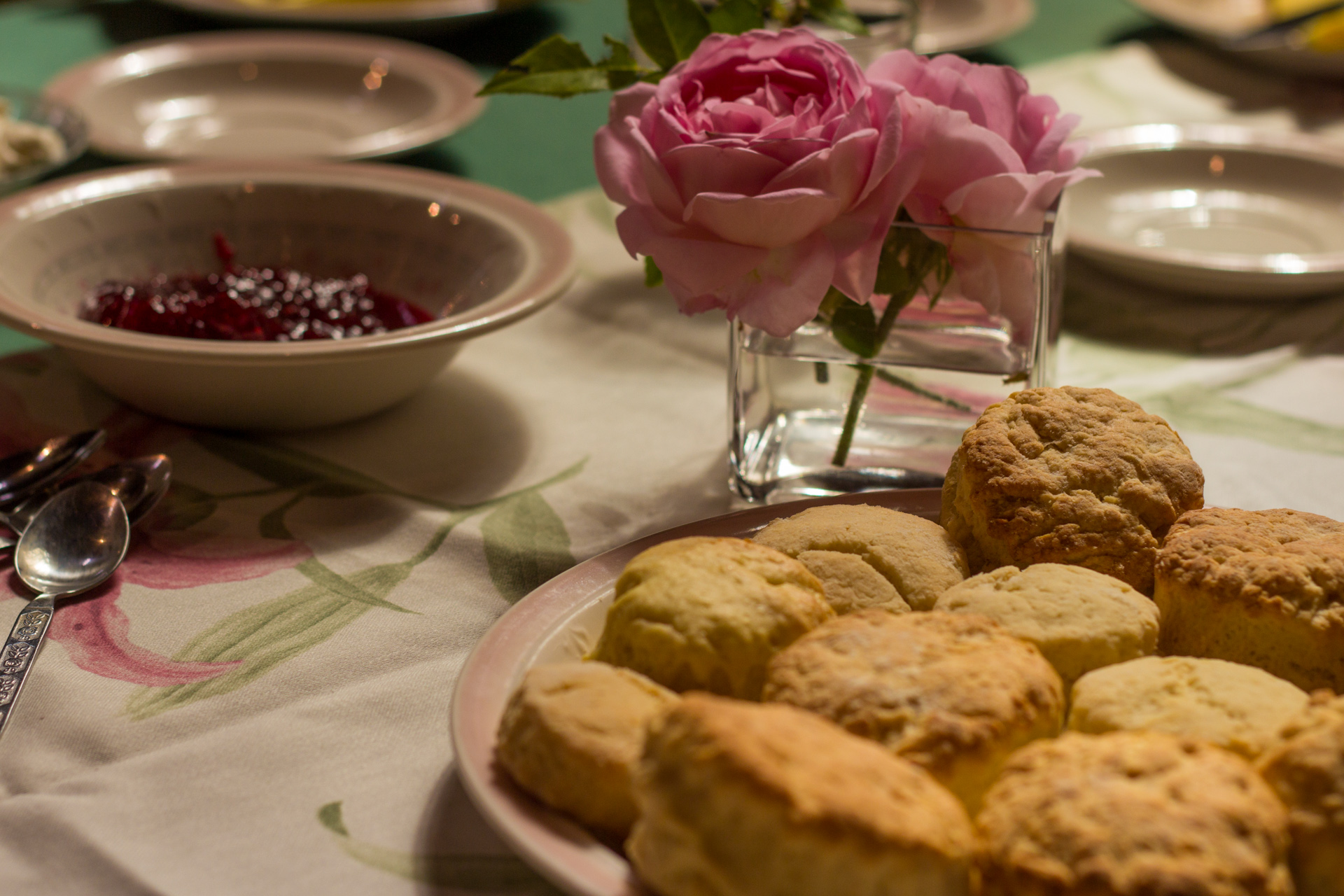
Almost as legendary as John Rutter himself, a famous St Luke’s cream-tea followed the talk.
[PHOTO: © Andrew Burdett 2015]
